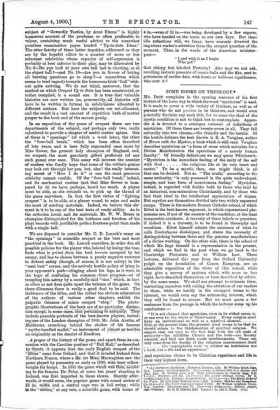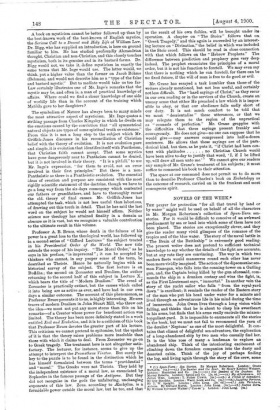SOME BOOKS ON THEOLOGY.*
INGE complains in the opening sentence of his first lecture of the loose way in which the-word "mysticism" is used.
It is made to cover a wide variety of thinkers, as well as of persons who do not profess to be thinkers, and would even pointedly disclaim any such title, for to some the ideal of the mystic condition is not to think but to contemplate. Appen- dix A is devoted to a catalogue raisonnh of definitions of mysticism. Of these there are twenty-seven in all, They fall naturally into two classes,—the friendly and the hostile. Of the hostile definers the best known is R. A. Vaughan, author of Hours with the Mystics, a book which is still read. Vaughan describes mysticism as "a form of error which mistakes for a Divine Manifestation the operations of a merely human faculty." Of friendly definitions we may quote Pfieiderer's : "Mysticism is the immediate feeling of the unity of the self with God the religious life at its very heart and centre." To be a mystic, then, one might think, is all that can be desired. Not so. "The truth," according to the same authority, "is only possessed in the quite undeveloped, simple, -and bare form of monotonous feeling." Mysticism, indeed, is regarded with dislike both by those who hold by an _historical, non-miraculous Christianity, and by those who find their ideal in the intellectual appreciation of dogma. But mystics are themselves divided into two widely separated camps. There is the modern Roman Catholic school, of which Ribet is the best-known exponent, in which supernatural phe- nomena are, if not of the essence-of-the condition, at the least inseparable accidents. A travesty of these beliefs or practices, if indeed it is a travesty, is to be found in theosophy and occultism. Ribet himself admits the existence of what he calls Contrefaccms diaboliques, and states the necessity of distinguishing between these and the genuine manifestations of a divine working. On the other side, there is the school of which Mr. Inge himself is a representative in the present, and which we find in the past when we go back to the Cambridge Platonists and to William Law. These lectures, delivered this year from the Oxford University pulpit on the foundation of Canon Bampton, are an admirable exposition of the views of this school, while they give a survey of systems which, with more or less right, have described themselves, or been described by others, by the same name. We shall not attempt to estimate them, contenting ourselves with calling the attention of our readers to them, while we testify in the strongest terms to the interest, we would even say the entrancing interest, which they will be found to arouse. But we must quote a few
sentences from the passage in which the lecturer SID= up his
. . _ conclusions :—
"It is not claimed that mysticism, even in its widest sense, is, or can ever be, the whole of Christianity. Every religion must have an institutional as well as a mystical element Still, at the present time, the greatest need seems to be that we should return to the fundamentals of spiritual religion. We cannot- shut our eyes to -the fact that both the old seats of authority—the infallible Church and the book—are fiercely assailed, and that our faith needs reinforcements. These can only come from the depths of the religious consciousness itself the impregnable rock' is neither an institution nor a book, but a life and an experience."
And mysticism claims to be Christian experience and life in their very highest form.
' • _ . _ . .
–
• (1,) Christian Mysticism: Hampton Lectures, 5899. By William Ralph Inge, MA. London : Methuen and Co. [I2s.]—(2.) A Serious Clatt to a Devout and gpiu /Aft. Br William Lou-, A.M. With Introduction. by Charles Stgg, D.D. London : Methuen and Co. [29.]—(3.1 The Ascent through Christ. By B. GrUlith,Jones, BA. London : James Bowden. [7s. 6d.)-44.) The Moral Orda•of the Woria. By Alexander Bahuain Bruce, D.D. London : Rodder and Stoughton. (.7s sa.]—(5.) The Hard Sayings of Jesus Christ. By William Leighton Grane, MA. London : Macmillan and Co. [58.)—(6.) Esasatology : Hebrew, Jewish. qua nuiettan. Br B. H. Charles, D.D. London : A. and C. Black. MC A book on mysticism cannot be better followed up than by the best-known work of the best-known of English mystics, the Serioui Call to a Devoid and Holy Life of William Law. Dr. Bigg, who has supplied an introduction, is here on ground familiar to him. He has studied profoundly Alexandrian thought, Christian and non-Christian, and this closely touches mysticism, both in its genuine and in its bastard forms. Dr. Bigg would not, we take it, define mysticism in exactly the same terms that Mi. Inge would use. The latter Would, we think, put a higher value than the former on Jacob Bame (Behmen), and would not describe him as a "type of the false and bastard mystic." But to mediate would take us too far. Law certainly illustrates one of Mr. Inge's remarks that the mystic may be, and often is, a man of practical knowledge of affairs. Where could we find a closer 'knowledge of one side of• worldly life than in the account of the training which Matilda gave to her daughters ?
The symbolism of Nature has always been to many minds the most attractive aspect of mysticism. Mr. Inge quotes a striking passage from Charles Kingsley in which he dwells on the emotions caused by the conviction that "all symmetrical natural objects are types of some spiritual truth or existence." From this it is not a long step to the subject which Mr. Griffith-Jones discusses in his reconciliation of Christian belief with the theory of evolution. It is not evolution pure and simple, it is evolution that identifies itself with Pantheism, that Christian faith cannot accept. That some mystics have gone dangerously near to Pantheism cannot be denied, but it is not involved in their theory. "It is a pitfall," to use Mr. Inge's expression, "for them to avoid, not an error involved in their first principles." But there is a non Pantheistic as there is a Pantheistic evolution. The essential ideas of creation and purpose are consistent with the most rigidly scientific statement of the doctrine, though we have to go a long way from the six-clays cosmogony which contented our fathers or grandfathers, and have to thoroughly recast the old. theory of final causes. Mr. Griffith-Jones has attempted the task, which is not less useful than laborious, of drawing out this truth in detail. That he has said the last word on the subject he would not himself affirm. Neither science nor theology has attained finality in a domain as obscure as it is vast, but we recognise a valuable contribution to the ultimate result in this volume.
Professor A. B. Bruce, whose death in the fulness of his power is a great loss to the theological world, has followed up in a second series of "Gifford Lectures" the subject treated in his Providential Order of the World. The new title extends the scope of his inquiry. "The Moral Order," as he says in his preface, "is impersonal"; it can be accepted by thinkers who cannot, in any proper sense of the term, be described as Theists. Hence he naturally begins with an historical survey of the subject. The first lecture is on Buddha; the second on Zoroaster and Dualism, the author returning to the second half of this subject in Lecture X., which bears the title of "Modern Dualism." The creed of Zoroaster is practically extinct, but the causes which called it into being are as active as ever, and have had in our own days a similar outcome. The account of this phenomenon, as Professor Brace presents it to Us, is highly interesting. He sees traces of modern Dualism in John Stuart Mill, who threw out the idea—we must not put any more stress than this on his remarks—of a Creator whose power for beneficent action was limited. The 'theory has been more definitely stated in a work entitled Evil and Evolution, and it is to a criticism of this book that Professor Bruce devotes the greater part of his lecture. This criticism we cannot pretend to epitomise, but the upshot of it is that the theory raises problems more insoluble than those with which it claims to deal, From Zoroaster we go on to Greek tragedy. The treatment here is not altogether satis- factory. The lecturer, for instance, seems to give up the attempt to interpret the Prometheus Vz'nctus. But surely the key to the puzzle is to be found in the distinction which he has himself formulated between the terms "providential" and "moral." The Greeks were not Theists. They held by the independent existence of a moral law, as enunciated by Sophocles in the famous passage of the Antigone. But they did not recognise in the gods the unfaltering, unchanging exponents of this law. Zeus, according to 2Eschylus, is a formidable power outside the moral law, but he too, and that as the result of his own foibles, will be brought under its - operation. A chapter on "The Stoics" follows that on "Greek Tragedy," and this again is succeeded by an interest- ing lecture on "Divination," the belief in which was included in the Stoic creed. This should be read in close connection with that which follows on the "Hebrew Prophets." The difference between prediction and prophecy goes very deep indeed. The prophet enunciates the principles of a moral order, but it is not his function to foretell. We may even say that there is nothing which he can foretell, for there can be no fixed future, if the will of man is free to do good or evil.
Mr. Grane has essayed a task humbler than those of the writers already mentioned, but not less useful, and certainly not less difficult. The "hard sayings of Christ," as they recur in our own reading or in the services of the Church, create an uneasy sense that either He preached a law which it is impos- sible to obey, or that our obedience falls sadly short of our duty. It is not - much comfort to be told that we must " deorientalise " these utterances, or that we may relegate them to the region of the impractical as"counsels of perfection." Mr. Crane grapples with the difficulties that these sayings present frankly and courageously. He does not give—no one can suppose that he would give — easy answers compressed into half-a-dozen sentences. He allows that these sayings are of the para- doxical kind, but then, as he puts it, "if Christ had been con-
tent with platitudes no Christian Church would have been alive to-day to justify that word, I, if I be lifted up, will draw all men unto me." We cannot give our readers any sample of Mr. Grane's treatment of his subjects; it must suffice to commend his book to their attention.
The space at our command does not permit us to do more than to describe Professor Charles's book on Eschatology as the outcome of research, carried on in the frankest and most courageous spirit.



































 Previous page
Previous page